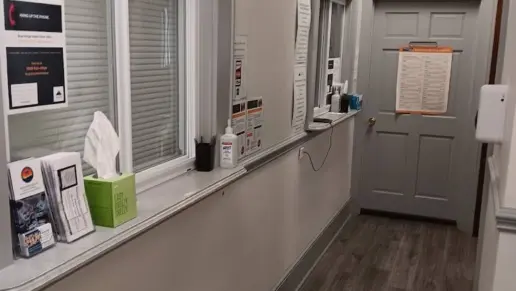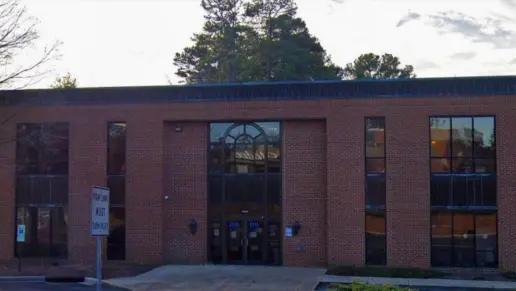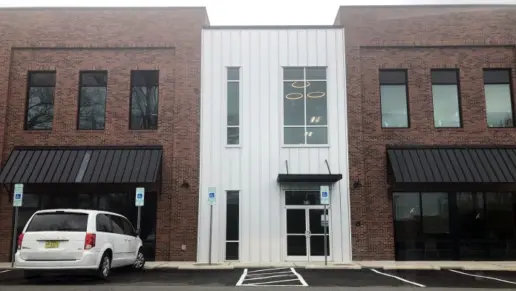About Carolina Outreach
Carolina Outreach is located in Raleigh, North Carolina. Carolina Outreach is a North Carolina based mental health services provider with a strength-based focus, highly trained staff and a positive atmosphere.
Outpatient treatment includes comprehensive assessments, individual, group, and family counseling, and medication management. Clients are able to work through mental health issues, trauma, grief, and more. If appropriate, Carolina Outreach can provide referrals to more specialized treatment like alcohol or drug rehab.
Specialized programs such as ACT and FCT help provide support for those who have struggled to find stability in their mental health and daily lives. Clients receive support and connections to community resources to help them achieve stability and live as independently as possible.
Carolina Outreach–Raleigh may accept a variety of insurance plans, such as Cigna, Humana, Blue Cross Blue Shield, Aetna, Amerigroup, Ambetter, United Healthcare, and more. Insurance plans vary, so be sure to verify coverage information and out of network benefits with the insurer.
Latest Reviews
Gallery
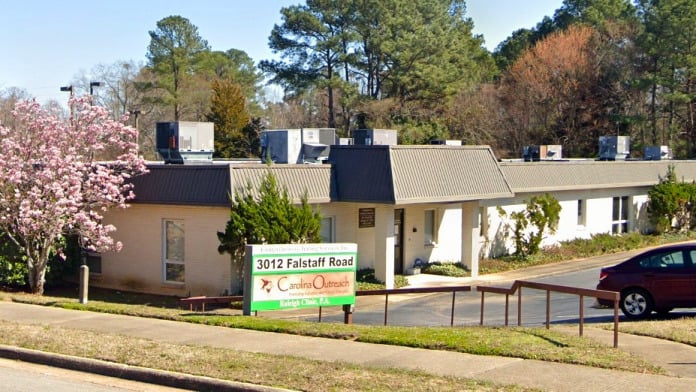
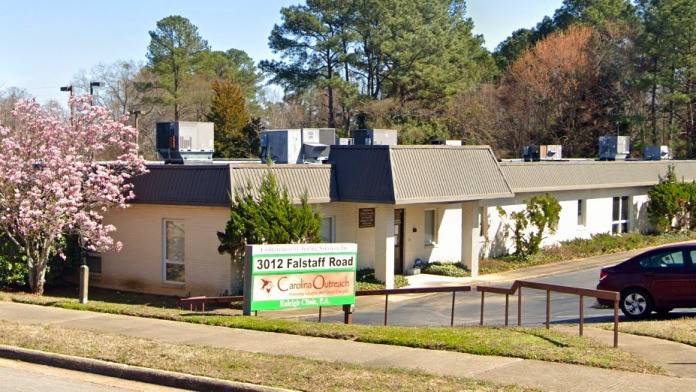
Location
Accepted Insurance
Other Forms of Payment
Private insurance refers to any kind of healthcare coverage that isn't from the state or federal government. This includes individual and family plans offered by an employer or purchased from the Insurance Marketplace. Every plan will have different requirements and out of pocket costs so be sure to get the full details before you start treatment.
Self-pay involves paying for treatment out of your own pocket. You can use savings or credit, get a personal loan, or receive help from family and friends to fund your treatment. If you don't have insurance or your insurance plan doesn't cover a specific program, self-pay can help ensure you still get the care you need.
Financial aid can take many forms. Centers may have grants or scholarships available to clients who meet eligibility requirements. Programs that receive SAMHSA grants may have financial aid available for those who need treatment as well. Grants and scholarships can help you pai for treatment without having to repay.
Medicaid is a state based program that helps lower-income individuals and families pay for healthcare. Medicaid covers addiction treatment so those enrolled can use their coverage to pay for rehab. When a program accepts Medicaid the client often pays very little or nothing out of their own pocket.
Addiction Treatments
Levels of Care
Treatments
The goal of treatment for alcoholism is abstinence. Those with poor social support, poor motivation, or psychiatric disorders tend to relapse within a few years of treatment. For these people, success is measured by longer periods of abstinence, reduced use of alcohol, better health, and improved social functioning. Recovery and Maintenance are usually based on 12 step programs and AA meetings.
There are many types of drug rehab in North Carolina. To receive treatment for addiction, you can choose from many inpatient and outpatient programs. Often, participants start with detox and work through a full continuum of care that continues with ongoing support for long-term recovery.
Many of those suffering from addiction also suffer from mental or emotional illnesses like schizophrenia, bipolar disorder, depression, or anxiety disorders. Rehab and other substance abuse facilities treating those with a dual diagnosis or co-occurring disorder administer psychiatric treatment to address the person's mental health issue in addition to drug and alcohol rehabilitation.
A combined mental health and substance abuse rehab has the staff and resources available to handle individuals with both mental health and substance abuse issues. It can be challenging to determine where a specific symptom stems from (a mental health issue or an issue related to substance abuse), so mental health and substance abuse professionals are helpful in detangling symptoms and keeping treatment on track.
Opioid rehabs specialize in supporting those recovering from opioid addiction. They treat those suffering from addiction to illegal opioids like heroin, as well as prescription drugs like oxycodone. These centers typically combine both physical as well as mental and emotional support to help stop addiction. Physical support often includes medical detox and subsequent medical support (including medication), and mental support includes in-depth therapy to address the underlying causes of addiction.
Programs







Clinical Services
Cognitive Behavioral Therapy (CBT) is a form of treatment that focuses on examining the relationships between thoughts, feelings, and behaviors. By exploring patterns of thinking that lead to self-destructive actions and the beliefs that direct these thoughts, people with mental illness can modify their patterns of thinking to improve coping. CBT is a type of psychotherapy that is different from traditional psychodynamic psychotherapy in that the therapist and the patient will actively work together to help the patient recover from their mental illness. People who seek CBT can expect their therapist to be problem-focused, and goal-directed in addressing the challenging symptoms of mental illnesses. Because CBT is an active intervention, one can also expect to do homework or practice outside of sessions.
Dialectical Behavior Therapy (DBT) is a modified form of Cognitive Behavioral Therapy (CBT), a treatment designed to help people understand and ultimately affect the relationship between their thoughts, feelings, and behaviors. DBT is often used for individuals who struggle with self-harm behaviors, such as self-mutilation (cutting) and suicidal thoughts, urges, or attempts. It has been proven clinically effective for those who struggle with out-of-control emotions and mental health illnesses like Borderline Personality Disorder.
Group therapy is any therapeutic work that happens in a group (not one-on-one). There are a number of different group therapy modalities, including support groups, experiential therapy, psycho-education, and more. Group therapy involves treatment as well as processing interaction between group members.
In individual therapy, a patient meets one-on-one with a trained psychologist or counselor. Therapy is a pivotal part of effective substance abuse treatment, as it often covers root causes of addiction, including challenges faced by the patient in their social, family, and work/school life.
Motivational Interviewing (MI) is a clinical approach to helping people with substance abuse issues and other conditions shift behavior in positive ways. It is more goal-oriented than traditional psychotherapy, as MI counselors directly attempt to get clients to consider making behavioral change (rather than wait for them to come to conclusions themselves). Its primary purpose is to resolve ambivalence and help clients become able to make healthy choices freely.
The goal of Trauma-Focused Cognitive Behavior Therapy (TF-CBT) is to help address the biopsychosocial needs of children with Post-traumatic Stress Disorder (PTSD) or other problems related to traumatic life experiences, and their parents or primary caregivers. TF-CBT is an evidence-based model of psychotherapy that combines trauma-sensitive interventions with cognitive behavioral therapy. Children and parents are provided knowledge and skills related to processing the trauma; managing distressing thoughts, feelings, and behaviors; and enhancing safety, parenting skills, and family communication.
Whether a marriage or other committed relationship, an intimate partnership is one of the most important aspects of a person's life. Drug and alcohol addiction affects both members of a couple in deep and meaningful ways, as does rehab and recovery. Couples therapy and other couples-focused treatment programs are significant parts of exploring triggers of addiction, as well as learning how to build healthy patterns to support ongoing sobriety.
Family Centered Treatment is part of Carolina Outreach’s continuum of care for at-risk children and their families. FCT is an evidence-based, in-home service that helps to preserve the family and prevent out-of-home placements. Parent-Child Interaction Therapy (PCIT) is an evidence-based treatment model backed by over 30 years of research. PCIT focuses on improving the quality of the parent-child relationship by changing parent-child interaction patterns. PCIT was developed for children ages 2–7 years with externalizing behavior disorders. In PCIT, parents are taught specific skills to establish or strengthen a nurturing and secure relationship with their child while encouraging pro-social behavior and discouraging negative behavior.
Life skills trainings involve all the skills a person must have in order to function successfully in the world. These include time management, career guidance, money management, and effective communication. Truly successful addiction recovery is based on the ability to not only live substance-free, but to thrive. Life skills teaches the practical necessities of functioning in society, which sets clients up for success in life, and therefore sobriety.
Amenities
-
Residential Setting
Accreditations

The Commission on Accreditation of Rehabilitation Facilities (CARF) is a non-profit organization that specifically accredits rehab organizations. Founded in 1966, CARF's, mission is to help service providers like rehab facilities maintain high standards of care.
CARF Accreditation: Yes
Contact Information
3012 Falstaff Road
Raleigh, NC 27610

